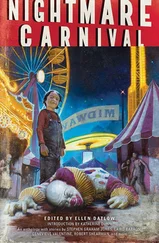Miranda won’t get off work for another two hours. She’ll take a cab home. I stump over to the bus mall, so delirious with relief and cold that I hallucinate Miranda on every corner. Sitting by the glare-blackened window on the Number 17, I rewrite the license number on an old receipt from my purse. The figures on my wrist are already smearing blue from the mist and my sweat.
I go in to work early the next morning. As I climb onto the bus, a small genderless child lurches in its mother’s arms, pointing at me and crowing, “Little Mama!” The woman holding the child goes a sudden hot red and grabs at the tiny hand, shushing. I turn and hop back down the steps and wave the driver on. I walk to the radio station.
By the time I get there I’ve decided that the license number has nothing to do with Miranda’s Miss Lick. How many big women use the side door of the Glass House? I could be tagging lumpily after a convincing middle-aged transvestite. If Lick is a phony name for subterranean use, I could trail an irrelevant specimen for weeks and never know it.
I slide a license trace request into the newsroom, make two fifteen-second commercial spots for Stereo Heaven and Sun River lunchmeat, and then tape the third installment of Beowulf for the Blind. I wait until after the Story Hour to check my message slot, and find the computer printout of the trace. It is Mary T. Lick. She hasn’t changed her name for the Glass House. Her address is a tony high-rise condo in the West Hills, just below the Rose Garden.
In the elevator it occurs to me that Miranda might be waiting for me in the lobby, hoping to guile me into another drawing session. I hold my breath as the doors open, but she isn’t there.
I cross the bridge over the concrete river of the sunken highway and walk down to the library. Lincoln High School is directly behind the station and the students on their lunch hour crowd the sidewalks. Two shrill-voiced girls argue hideously on the Charles Dickens bench outside the library. I swim through the heavy doors and up the curving white marble stairs to the index files.
Mary T. Lick has a card of her own, just before Thomas R. Lick, her father. They are both buried in microfilm. I go up another two flights to the periodical room and stake out a viewing machine in the most obscure corner. I camp there with a stack of film reels of old newspapers.
There she is, not smiling, in the society columns. A younger Mary Lick is not smiling at the Hunt Club Opera Benefit. Mary Lick is trapped gloomily between two vivacious gargoyles at the City Club. Mary Lick, standing uncomfortably next to the deep V neckline of a Rose Princess, frowns at the crowning of the Rose Festival Queen. A much younger Mary Lick stands glumly, behind a bald and furious-faced man billed in the caption as Thomas R. Lick, at the ribbon cutting for the Thomas R. Lick Swimming Pool at the TAC Club.
The text skates over guest lists, wardrobes, and buffet menus. There is no comment on Mary’s wardrobe, which is the same in all cases, a dark featureless business suit.
Thomas R. is referred to variously as the Lickety Split Food king, mogul, or tycoon. The grimmest and most recent photo of Mary Lick shows her staring moodily at a Salvation Army truck loaded with cardboard boxes. “24 Lickety Split Thanksgiving Dinners.” The caption calls Mary “The Lickety Split Food Heiress,” suggesting that Thomas R. has passed on to the obituary page, probably with a “Lick Splits” headline.
There she is. The old man is spread out on the worm buffet and Daughter Mary is dumping hundreds of Lickety Split dinners into socially unacceptable hands. The seven-year-old item comments that this is the first contribution in the history of the Lickety Split Corporation, but says, coyly, that it might “signify a new role for the company in the future.”
I cram the copies into my bag and chug home. There’s a note under my door. A pencil smear from Miranda. “Come up and let me draw you.”
When I knock, her door explodes inward, her huge frame surrounded by light. “Finally.” Reaching for me.
“I can’t today. I have some work to do.” Her face falls into conventions masking disappointment. My chest lurches.
“But how did it go with that woman, about your tail?”
She flickers for the connection. Not thinking about it.
“Oh, there’s no hurry. She says it’s fine to wait until the semester ends.”
“To decide?”
“No. To do it. Have it done.”
“You decided.”
“What the hell. It’s silly not to.”
Her insolent look. The careless smirk. She is punishing me for being unavailable. I turn away, sick, and feel my way back down the hall.
She calls after me.
“When can you sit for me again? Tomorrow? The afternoon? Miss McGurk?”
I wave and go downstairs to my room and shut the door behind me and lock it.
Pacing and grinding my teeth. Throwing my wig on the floor and stamping. Why does she make me so angry? My rage terrifies me. I am a monster. I would rip her to shreds. I would swing her up by her round pink heels and snap her long body until that bright, hairy head smashed against the wall. Falling on my knees, shaking. Tangling my hands to keep from breaking something. Sudden gratitude for the nuns, realizing that if she had stayed with me all the years of her growing up I would have murdered her — the arrogant, imbecile bitch, my baby, beautiful Miranda.
I end up curled on the floor, blubbering and gasping. No one comes to comfort me. I lie there until I’m bored and embarrassed at having dried snot streaks crackling on my cheeks. I get angry so rarely. Now twice in two days at Miranda.
I take a shower, get into a flannel nightgown, make instant coffee with hot water from the sink, and push the window up so I can see through. The streak of sky visible above the alley is heavy. I sit on the sill drinking death’s-head brew and watching the shadow creep higher on the blind wall of the warehouse across the way. I can hear the pigeons fuddling in the eaves. Rain begins to splat a shine over the puddle on the garage roof below me.
Downstairs the phone rings and then stops. Lil’s voice comes, shrill up the staircase, “Forty Wuunnn,” and from far away a door slams and the redheaded defrocked Benedictine begins his desperate avalanche down the stairs. The pipes gurgle. The heat is coming on.
I drag the big old costume trunk out of the closet and open it. The Miranda Box I call it, though there is little enough of her in it. The shallow tray in the top of the trunk holds it all. School photos. The stack of report cards. The bundled letters from Sister T. that came four times a year for sixteen years. Progress reports: “Miranda is reading two years beyond her grade level. Her disposition is cheerful but marred by stubbornness and a disruptive tendency.” The test scores. The list of inoculations. The chicken pox report. An indignant letter folded around a printed form crawling with the results of a medical examination.
She was fifteen that year and had run away and hooked up with an occult guitarist moonlighting as a United Parcel delivery driver who hid her in his “bohemian”—as the report called it — apartment for three weeks until she got bored and strolled back to the school. She was indifferent to repentance, according to the nun, and far from a virgin, according to the doctor. Heavenly Mary had prevented her from getting pregnant or diseased. They threatened to throw her out or to turn her over to the juvenile authorities. In the end my monthly payments increased by 50 percent and she stayed.
Fingering the blistering letter, I remember precisely the hoops my heart went through over the incident. I was terrified for her, but strangely delighted, as though her wildness were a triumph of her genes over indoctrination. I lay the thin sheaf of drawings she gave me on top of the rest, and then lift the tray out and set it aside.
Читать дальше












